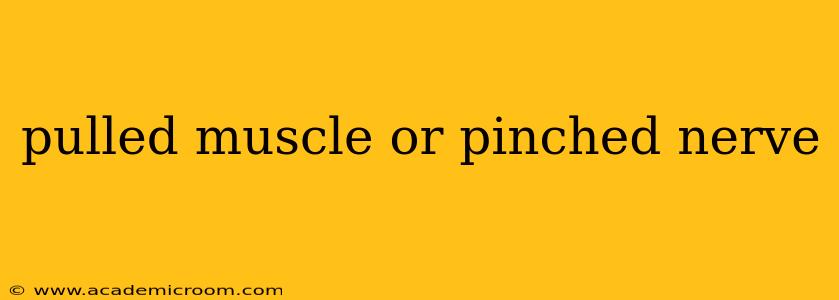Experiencing pain in your back, neck, or limbs can be debilitating. Two common culprits are pulled muscles and pinched nerves. While both cause discomfort and limit movement, understanding their differences is crucial for proper diagnosis and treatment. This comprehensive guide will help you differentiate between a pulled muscle and a pinched nerve, exploring the symptoms, causes, and effective relief strategies.
What is a Pulled Muscle?
A pulled muscle, also known as a muscle strain, occurs when muscle fibers are overstretched or torn. This typically happens due to sudden movements, overuse, or inadequate warm-up before physical activity. The severity of a pulled muscle ranges from mild discomfort to severe pain, depending on the extent of the damage.
Symptoms of a Pulled Muscle:
- Localized pain: Pain is usually concentrated in the affected muscle.
- Muscle spasms: Involuntary muscle contractions may occur.
- Swelling: Inflammation and swelling are common.
- Bruising: Discoloration of the skin may be present in more severe cases.
- Limited range of motion: Difficulty moving the affected muscle or joint.
- Tenderness to the touch: The affected area is painful when touched.
What is a Pinched Nerve?
A pinched nerve, also known as nerve compression, happens when surrounding tissues, such as bones, muscles, tendons, or ligaments, put pressure on a nerve. This pressure disrupts the nerve's function, leading to pain, numbness, tingling, and weakness. Pinched nerves can occur anywhere in the body but are common in the neck (cervical radiculopathy) and lower back (lumbar radiculopathy).
Symptoms of a Pinched Nerve:
- Pain that radiates: Pain often travels along the path of the affected nerve, extending beyond the initial point of compression. This is called radiating pain.
- Numbness and tingling: A pins-and-needles sensation is characteristic of nerve compression.
- Weakness: Muscle weakness in the area supplied by the pinched nerve is common.
- Burning or shooting pain: Intense, sharp pain may occur.
- Changes in reflexes: Reflexes in the affected area might be diminished or absent.
Pulled Muscle vs. Pinched Nerve: Key Differences Summarized
| Feature | Pulled Muscle | Pinched Nerve |
|---|---|---|
| Primary Cause | Muscle overstretching or tearing | Nerve compression by surrounding tissues |
| Pain Location | Localized to the affected muscle | Radiates along the nerve's path |
| Type of Pain | Aching, soreness, cramping | Sharp, shooting, burning, tingling, numbness |
| Other Symptoms | Swelling, bruising, muscle spasms | Weakness, altered reflexes |
| Onset | Often sudden, during or after activity | Can be gradual or sudden |
How are Pulled Muscles and Pinched Nerves Diagnosed?
Diagnosis typically involves a physical examination by a doctor or physical therapist. They will assess your symptoms, range of motion, and neurological function. Imaging tests, such as X-rays, MRIs, or CT scans, may be necessary to rule out other conditions and confirm the diagnosis, particularly for pinched nerves.
How are Pulled Muscles and Pinched Nerves Treated?
Treatment for both conditions varies depending on severity. Mild cases may respond to conservative measures, while more severe cases might require medical intervention.
Treatment for Pulled Muscles:
- RICE Method: Rest, Ice, Compression, and Elevation are often recommended.
- Over-the-counter pain relievers: Ibuprofen or naproxen can help reduce pain and inflammation.
- Physical therapy: Exercises to strengthen and stretch the affected muscle.
Treatment for Pinched Nerves:
- Pain relievers: Over-the-counter or prescription pain medications.
- Anti-inflammatory medications: To reduce swelling and inflammation.
- Physical therapy: To improve posture, strengthen muscles, and increase flexibility.
- Injections: Corticosteroid injections can help reduce inflammation and pain.
- Surgery: In rare cases, surgery may be necessary to relieve pressure on the nerve.
How Long Does it Take to Recover From a Pulled Muscle or Pinched Nerve?
Recovery time varies greatly depending on the severity of the injury and the individual's overall health. Mild strains may heal within a few weeks, while more severe injuries can take several months. Pinched nerves can also have variable recovery times, ranging from weeks to months, or even longer in some cases. Following your doctor's recommendations and adhering to a consistent treatment plan is crucial for optimal recovery.
Can I Prevent Pulled Muscles and Pinched Nerves?
Prevention strategies include:
- Proper warm-up before exercise: Prepare your muscles for activity.
- Stretching regularly: Maintain muscle flexibility and prevent tightness.
- Maintaining good posture: Avoid strain on your muscles and nerves.
- Ergonomic workplace setup: Ensure your workspace supports proper posture and reduces strain.
- Gradual increase in activity levels: Avoid sudden increases in physical exertion.
This information is for general knowledge and does not constitute medical advice. Always consult a healthcare professional for diagnosis and treatment of any medical condition.
